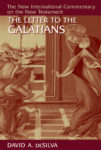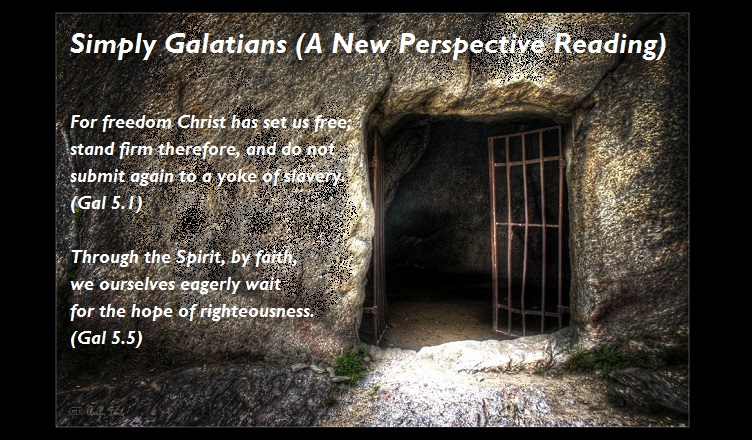From Galatians 1

The Early Perspective on Paul has equipped us to better understand Paul’s Gospel. What is Paul’s gospel? Paul says in Galatians there is only one gospel and anyone who preaches a contrary gospel ought to be destroyed. In this post we consider what Paul’s gospel is from his varied statements in 1 Corinthians, Romans and Acts and then apply this understanding of the gospel to what we read in Galatians.
This post is part of my Simply Galatians series.
Passage and Comments
For a bit of context, as mentioned in my Introduction to this series, Paul has heard the Gentile Christians were again observing various festivals and sabbaths commanded in the law of Moses and were considering circumcision. We will soon learn from this that Paul believes something has gone horribly wrong with the Gentiles and has taken action by writing his letter.
Gal 1.1-5
He begins his letter in a similar way to many of his letters. With grace and peace.
1 Paul, an apostle—not from men nor through man, but through Jesus Christ and God the Father, who raised him from the dead— 2 and all the brothers who are with me,
To the churches of Galatia: 3 Grace to you and peace from God our Father and the Lord Jesus Christ,
4 who gave himself for our sins to deliver us from the present evil age, according to the will of our God and Father, 5 to whom be the glory forever and ever. Amen. (Gal 1.1-5)
‘An apostle’, ‘not from men but through Jesus Christ’. Paul introduces himself as an apostle. A sent one, sent from the risen Jesus Christ and not from men.
He introduces himself in a manner which highlights his gospel ministry has sovereign authority.
He says this to distinguish himself from worldly authorities, whom we will see have been imposing their will on the Galatians. Paul claims the higher authority. His apostleship and commission to preach the gospel come from Jesus Christ himself.
‘Grace and peace’. Paul begins the letter with conventions which were standard for letter writing in his time. Sender, recipient and a word of greeting. Grace and peace were commonly included in the Greco-Roman era, however Paul puts a Christian spin on them, finding their source in the Father and the Lord Jesus Christ (p109,117, DeSilva, NICNT Galatians).
‘Gave himself for our sins’. Paul’s introduction also highlights a significant theme of the letter. Jesus’ voluntary death on the Cross. His voluntary death was ‘for our sins’ indicating the sacrificial and atoning character of his death.

The opening greeting identifies this χάρις with the act of Jesus’ self-giving (τοῦ δόντος ἑαυτὸν ὑπὲρ τῶν ἁμαρτιῶν ἡμῶν; “who gave himself for our sins,” 1:4), a phrase possibly derived from early Christian tradition but clearly important to Paul; he later adapts it when speaking of “the Son of God who loved me and gave himself for me” (τοῦ ἀγαπήσαντός με καὶ παραδόντος ἑαυτὸν ὑπὲρ ἐμοῦ, 2:20).
This self-giving of Christ, “the Christ-gift,” is an event (note the aorist tenses), and refers here specifically to his self-donation in death. …
The Christological configuration of the gift of God is clear from the very first sentences of Galatians. Paul reworks Jewish tradition throughout this letter, whose central chapters are thick with scriptural citations and allusions, but he interprets the divine beneficence celebrated in Judaism through the prism of the Christ-event. (p331f, Barclay, Paul and the Gift)
‘To deliver us from the present evil age’. Paul is thinking in terms of different moral eras in time. God has introduced the new age through Christ.
Jesus’ death has delivered them from the ‘present evil age’. Paul understands the current age to be one in bondage to sin, death (Rom 6.6-22; 8.2-4; Eph 2.1-3) and the flesh (Gal 5.13-26; Rom 8.4-11).
Deliverance is always from something bad and into something good. Jesus’ death on the cross delivers sinners from the present evil age, the dominion of sin, death and the flesh, into the coming age, God’s new creation, a renewal of all things (p120, DeSilva, Galatians). This new age has been inaugurated by Christ’s resurrection, thus believers are now under God’s dominion of grace, righteousness and the Spirit.
With this in mind, Paul has nothing good to say about the Galatians, which stands out from his other letters (Dunn, Galatians; McKnight, Galatians). He turns very quickly to the issue at hand.
Gal 1.6-12

6 I am astonished that you are so quickly deserting him who called you in the grace of Christ and are turning to a different gospel— 7 not that there is another one, but there are some who trouble you and want to distort the gospel of Christ. 8 But even if we or an angel from heaven should preach to you a gospel contrary to the one we preached to you, let him be accursed. 9 As we have said before, so now I say again: If anyone is preaching to you a gospel contrary to the one you received, let him be accursed.
10 For am I now seeking the approval of man, or of God? Or am I trying to please man? If I were still trying to please man, I would not be a servant of Christ. 11 For I would have you know, brothers, that the gospel that was preached by me is not man’s gospel. 12 For I did not receive it from any man, nor was I taught it, but I received it through a revelation of Jesus Christ. (Gal 1.6-12)
‘Deserting him’. God calls people through the gospel and this involves turning from idols to him in repentance and faith. Paul refers to God’s divine call made through the gospel. By turning to a different gospel, they are in also turning away from God who called them. There are profoundly relational aspects to the gospel and our orientation towards God.

‘Grace of Christ’. Paul says they were ‘called’ in the ‘grace of Christ’. The expression ‘grace of Christ’ is used in parallel with the ‘gospel of Christ’. The two are obviously related. Paul depicts God’s calling as a manifestation of his favour in some sense (p125, DeSilva, Galatians). We will soon learn the gospel is a message about God’s gift of Christ which is supremely manifested His life, death and resurrection.
God’s grace is the Christ-event revealed in the gospel.
‘Accursed’. The word has its origin in the Hebrew for destruction. Paul condemns any person or being who preaches another gospel with destruction. Getting the gospel right is important. Paul implies here his opponents who preach another gospel are accursed.
‘Gospel’, ‘there is no other gospel’. It follows from this to ask, ‘What is Paul’s gospel?’ I’ve discussed Paul’s understanding of the gospel in more detail in other posts (page, series, history). For now, Paul gives his outline of the gospel message in 1 Corinthians 15.3-5 and I’ve also included another example of Paul’s gospel in Acts 13 to show the similarities.
| Paul’s Gospel Outline
1 Cor 15.3-5 |
Paul’s Gospel Acts 13.26-33 |
| 15 Now I would remind you, brothers, of the gospel I preached to you, which you received, in which you stand, 2 and by which you are being saved, if you hold fast to the word I preached to you—unless you believed in vain. 3 For I delivered to you as of first importance what I also received: | 26 “Brothers, sons of the family of Abraham, and those among you who fear God, to us has been sent the message of this salvation.
27 For those who live in Jerusalem and their rulers, because they did not recognize him nor understand the utterances of the prophets, which are read every Sabbath, fulfilled them by condemning him. |
| that Christ died for our sins in accordance with the Scriptures, | 28 And though they found in him no guilt worthy of death, they asked Pilate to have him executed. 29 And when they had carried out all that was written of him, |
| 4 that he was buried, | they took him down from the tree and laid him in a tomb. |
| that he was raised on the third day in accordance with the Scriptures, | 30 But God raised him from the dead, |
| 5 and that he appeared to Cephas, then to the twelve. | 31 and for many days he appeared to those who had come up with him from Galilee to Jerusalem, who are now his witnesses to the people. |
| 32 And we bring you the good news that what God promised to the fathers, 33 this he has fulfilled to us their children by raising Jesus, |
According to Paul, the gospel is the story of Jesus’ life, death, burial, resurrection, appearances, ascension and coming judgment which declares him the risen Christ.
The gospel fulfills God’s promises and prophecies in the Old Testament scriptures and brings about salvation for all who believe and give their allegiance to Jesus as king (1 Cor 15.3-5; Rom 1.1-5, 16-17; 2.16; 10.9-10; 2 Tim 2.8; Jn 20.31; Acts 13.26-33).
 “Paul and the rival teachers agree on certain key points of this good news, notably God’s appointment of Jesus of Nazareth as King and Lord and the invitation to respond by pledging one’s loyalty and giving one’s full obedience to the new Princeps. They differed on the manner of this obedience (whether obedience was to be driven by the Torah or by the Spirit of Christ), which betrays the deeper difference between them concerning the place of Israel and the Jewish people in God’s new order.” (p126, DeSilva, Galatians)
“Paul and the rival teachers agree on certain key points of this good news, notably God’s appointment of Jesus of Nazareth as King and Lord and the invitation to respond by pledging one’s loyalty and giving one’s full obedience to the new Princeps. They differed on the manner of this obedience (whether obedience was to be driven by the Torah or by the Spirit of Christ), which betrays the deeper difference between them concerning the place of Israel and the Jewish people in God’s new order.” (p126, DeSilva, Galatians)
(Contra. Schreiner, Galatians, who believes ‘the truth of the gospel is that human beings are saved not through the works of the law but by faith in Jesus Christ. They put their trust in Jesus’ atoning death on their behalf and are thereby declared to be right with God’. His gospel is thoroughly soterian and he repeatedly denies believing Jesus is the risen Christ is sufficient for salvation. For a better understanding on the gospel in Galatians see NT Wright, Gospel and Theology in Galatians).
Although there may be many variations of the one Gospel. For Paul there is only one gospel. This gospel describes the story of Jesus and is God’s gift to us.
Of importance to our reading of Galatians note also Paul’s gospel message in many instances does not refer to ‘justification by faith apart from works of law’. While as we will see in Galatians ‘justification by faith apart from works of law’ is an implication of the gospel, it is not a necessary part of the gospel message itself.
The implications of the gospel message relevant to Galatians will be addressed in the next post.
‘Seeking approval’. Paul refers again to the political power play at hand in who has greater authority. The Galatians are torn between opposing parties claiming authority. Paul has already claimed sovereign authority for his apostolic ministry and now he does so for his gospel message.
‘Not man’s gospel’. Paul does not care for worldly approval. He seeks God’s approval. He seeks to please God (cf. 2 Cor 5.9-11). He does this by presenting God’s gospel which announces God’s grace in Jesus’ life, death, resurrection, appearances and coming judgment.
Gal 1.13-24
13 For you have heard of my former life in Judaism, how I persecuted the church of God violently and tried to destroy it. 14 And I was advancing in Judaism beyond many of my own age among my people, so extremely zealous was I for the traditions of my fathers.
15 But when he who had set me apart before I was born, and who called me by his grace, 16 was pleased to reveal his Son to me, in order that I might preach him among the Gentiles, I did not immediately consult with anyone; 17 nor did I go up to Jerusalem to those who were apostles before me, but I went away into Arabia, and returned again to Damascus.
18 Then after three years I went up to Jerusalem to visit Cephas and remained with him fifteen days. 19 But I saw none of the other apostles except James the Lord’s brother. 20 (In what I am writing to you, before God, I do not lie!)
21 Then I went into the regions of Syria and Cilicia. 22 And I was still unknown in person to the churches of Judea that are in Christ. 23 They only were hearing it said, “He who used to persecute us is now preaching the faith he once tried to destroy.” 24 And they glorified God because of me. (Gal 1.13-24)
‘Former life in Judaism’. Paul in several locations describes some of his former life. We know he was trained under Gamaliel, a highly esteemed Jewish teacher (Acts 22.3). We know he had Jewish credentials which secured him a place in the covenant community (Phil 3.3-6). We know he persecuted the church (Acts 8.1-3).
But meeting the risen Lord Jesus changed all this.
‘Called me by his grace’. Paul refers to his initial meeting with Jesus. The time when God saved him and called him into gospel ministry (Acts 9.1f; 26.14-23). For Paul, his understanding of God’s grace is uniquely bound up with his commission into gospel ministry (Rom 1.5, 14-15; 12.3, 6; 15.15; 1 Cor 3.10; 15.10; Gal 2.9; Eph 3.2, 7, 8; 4.7).
‘Reveal his Son’. A requirement to be an apostle was first hand knowledge of the gospel events (Acts 1.21-22; 1 Cor 15.8-11). Paul received visions from God about the life, death and resurrection of Jesus which equipped him as an apostle to preach the gospel to the Gentiles (cf. Acts 9.3-9; 26.19; 2 Cor 12.4).
‘I did not consult with anyone’. Paul emphasises the supernatural nature of his knowledge of the gospel. God divinely equipped him for this gospel ministry. He did not have to hear and learn the gospel from men. Rather he received it from God, which is part of the reason why his apostleship has God’s sovereign approval.
Gal 2.1-10
2 Then after fourteen years I went up again to Jerusalem with Barnabas, taking Titus along with me. 2 I went up because of a revelation and set before them (though privately before those who seemed influential) the gospel that I proclaim among the Gentiles, in order to make sure I was not running or had not run in vain.
3 But even Titus, who was with me, was not forced to be circumcised, though he was a Greek. 4 Yet because of false brothers secretly brought in—who slipped in to spy out our freedom that we have in Christ Jesus, so that they might bring us into slavery— 5 to them we did not yield in submission even for a moment, so that the truth of the gospel might be preserved for you.
6 And from those who seemed to be influential (what they were makes no difference to me; God shows no partiality)—those, I say, who seemed influential added nothing to me. 7 On the contrary, when they saw that I had been entrusted with the gospel to the uncircumcised, just as Peter had been entrusted with the gospel to the circumcised 8 (for he who worked through Peter for his apostolic ministry to the circumcised worked also through me for mine to the Gentiles),
9 and when James and Cephas and John, who seemed to be pillars, perceived the grace that was given to me, they gave the right hand of fellowship to Barnabas and me, that we should go to the Gentiles and they to the circumcised. 10 Only, they asked us to remember the poor, the very thing I was eager to do. (Gal 2.1-10)
There are two themes I wish to discuss in this section. The first (in this post) concerns Paul and Peters common understanding of the gospel message. The second (in the next post) are the implications of that gospel.
‘Set before them the gospel I proclaim among the Gentiles’. Paul describes the time when he went before the leaders in the Jerusalem church. (The majority of commentators believe this is the Acts 15 Jerusalem council) He told them the gospel message he was proclaiming to the Gentiles. He did this more out of courtesy, since his gospel was non-negotiable (Dunn, Galatians). Paul says that these leaders affirmed his gospel and they realised God had been using him in ministry to the Gentiles.
‘Just as Peter was entrusted with the gospel to the circumcised’. Paul says both he and Peter were commissioned to deliver the same gospel message to different groups. Paul the uncircumcised Gentiles. Peter the circumcised Jews.
Augustine of Hippo (c.e. 354–430), a very influential early church father highlighted the common understanding of the gospel in his argument against Faustus;

This was Paul’s gospel; and it was also the gospel of the other apostles, and of all faithful stewards of so great a mystery. For Paul says elsewhere, “Whether, therefore, I or they, so we preach, and so ye believed.” They did not all write the gospel, but they all preached it.
The name evangelist is properly given to the narrators of the birth, the actions, the words, the sufferings of our Lord Jesus Christ. The word gospel means good news, and might be used of any good news, but is properly applied to the narrative of the Saviour.
If, then, you teach something different, you must have departed from the gospel. (Ch 2, Book 2, Against Faustus)
So this begs the question. What is Peter’s gospel which he delivered to the circumcised Jews?
We have a couple examples from Acts and we can compare them to Paul’s outline in 1 Corinthians 15.
| Paul’s Gospel Outline
1 Cor 15.3-5 |
Peter’s Gospel Acts 2.22-36 | Peter’s Gospel (Acts 10.34-43) |
| 15 Now I would remind you, brothers, of the gospel I preached to you, which you received, in which you stand, 2 and by which you are being saved, if you hold fast to the word I preached to you—unless you believed in vain. 3 For I delivered to you as of first importance what I also received: | 22 “Men of Israel, hear these words: Jesus of Nazareth, a man attested to you by God with mighty works and wonders and signs that God did through him in your midst, as you yourselves know | 36 As for the word that he sent to Israel, preaching good news of peace through Jesus Christ (lhe is Lord of all), 37 you yourselves know what happened throughout all Judea, beginning from Galilee after the baptism that John proclaimed: 38 how God anointed Jesus of Nazareth with the Holy Spirit and with power. He went about doing good and healing all who were oppressed by the devil, for God was with him. |
| that Christ died for our sins in accordance with the Scriptures, | 23 this Jesus, delivered up according to the definite plan and foreknowledge of God, you crucified and killed by the hands of lawless men. | 39 And we are witnesses of all that he did both in the country of the Jews and in Jerusalem. They put him to death by hanging him on a tree, |
| 4 that he was buried, | ||
| that he was raised on the third day in accordance with the Scriptures, | 24 God raised him up, loosing the pangs of death, because it was not possible for him to be held by it. … 30 Being therefore a prophet, and knowing that God had sworn with an oath to him that he would set one of his descendants on his throne, 31 he foresaw and spoke about the resurrection of the Christ, that he was not abandoned to Hades, nor did his flesh see corruption. | 40 but God raised him on the third day |
| 5 and that he appeared to Cephas, then to the twelve. | 32 This Jesus God raised up, and of that we all are witnesses. 33 Being therefore exalted at the right hand of God, and having received from the Father the promise of the Holy Spirit, he has poured out this that you yourselves are seeing and hearing. … | and made him to appear, 41 not to all the people but to us who had been chosen by God as witnesses, who ate and drank with him after he rose from the dead. |
| 36 Let all the house of Israel therefore know for certain that God has made him both Lord and Christ, this Jesus whom you crucified.” | 42 And he commanded us to preach to the people and to testify that he is the one appointed by God to be judge of the living and the dead. 43 To him all the prophets bear witness that everyone who believes in him receives forgiveness of sins through his name.” |
As we would expect Peter’s gospel message was very much like Paul’s. Peter’s gospel tells the story of Jesus (his life, death, resurrection, appearances and coming judgment) and declares him Lord and Christ. His gospel is in accordance with the Old Testament promises and prophecies that anticipate Christ’s coming. His gospel brings about forgiveness and salvation for all those who believe.
John Chrysostom (c.e. 349–407) for example says a few things about different people preaching the one gospel;

We assert, therefore, that, although a thousand Gospels were written, if the contents of all were the same, they would still be one, and their unity no wise infringed by the number of writers. So, on the other hand, if there were one writer only, but he were to contradict himself, the unity of the things written would be destroyed. For the oneness of a work depends not on the number of its authors, but on the agreement or contradictoriness of its contents. Whence it is clear that the four Gospels are one Gospel; for, as the four say the same thing, its oneness is preserved by the harmony of the contents, and not impaired by the difference of persons. (John Chrysostom, Commentary on Galatians, Gal 1.6)
In the following posts we move from Paul’s defense of his apostleship and his gospel into the implications of this gospel for whether Gentile believers need to observe the law of Moses.
Words for Believers

Paul’s letter to the Galatians begins stressing the importance of the gospel. But what is his gospel? Is his gospel justification by faith apart from works of law? Is it about believing vs. doing? Faith and grace vs. works-righteousness? Is Paul’s gospel about how we can be saved?
No, none of these. According to Paul and Peter the gospel is the story of Jesus’ life, death, burial, resurrection, appearances, ascension and coming judgment which declares him the risen Christ. The gospel fulfills God’s promises and prophecies in the Old Testament scriptures and brings about salvation for all who believe and give their allegiance to Jesus as king.
There are of course implications that arise from the apostolic gospel. But those implications are not the gospel itself. This is the chief mistake many make today I think. Confusing the gospel message with its effects and implications.

Paul urges us to watch our gospel lest it be transformed into a “different gospel” that prevents acceptance with God. Let us be careful to understand that tampering with the gospel is not Christian experimentation with new ideas. The gospel is a sacred trust that remains, like Jesus Christ, the same yesterday, today, and tomorrow.
Society and culture change; applications change; Christian lifestyle and even specific doctrinal formulations change; but the gospel of Jesus Christ does not change.
We are given every freedom to explore the vast domains of life and reality that are still unknown frontiers to us. We are given every freedom to explore the implications of the gospel for our world today. But we are never given any freedom to alter the original gospel of the grace of God in Christ. (McKnight, S., 1995. Galatians, Grand Rapids, MI: Zondervan Publishing House.)
Click here to go to the next post in the series.
Copyright © Joshua Washington and thescripturesays, 2017. All Rights Reserved.





